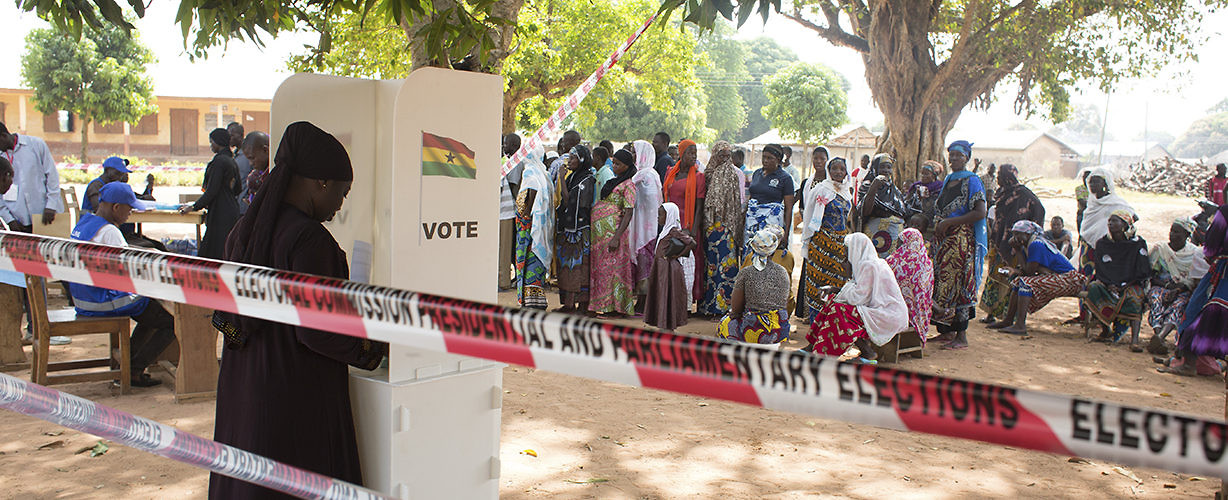Ghanaians vote in the recent presidential elections. Nakpayili, Ghana, December 7, 2016. (Louise Wateridge/Pacific Press/Associated Press)
Within 48 hours of results being declared in last week’s Ghanaian general elections, a transition team was formed to facilitate the transfer of power from the ruling National Democratic Congress (NDC) to the newly elected New Patriotic Party. The latter’s Nana Addo Dankwa Akufo-Addo won with 53.8% of the vote, which was much more than closest contender and current President John Dramani Mahama, with 44.4%. Mahama conceded defeat, Akufo-Addo has been magnanimous in victory, and the incoming and outgoing administrations have committed to a peaceful handover.
This is the third political transition since Ghana’s Fourth Republic was inaugurated in 1993 and the second time a law governing the process will be followed, after its passage in the aftermath of the chaotic transitional processes of 2000 and 2008. The voting itself was the most uneventful and efficient in Ghana’s history, apart from a few hitches that delayed the opening of polling stations across the country.
This also occurred despite the election seeing some novel developments. First, it was won without going to a runoff. No opposition party has been victorious during the first round of elections since 1992. The transition team therefore has a lot of time to undertake the handover, which must occur before the constitutionally stipulated January 7; previous teams had less than one week to prepare.
Second, a ruling government is handing over power even though its candidate served only one term. Mahama’s loss has been attributed to widespread allegations of corruption, excessive government borrowing, increased taxes, and a preference for infrastructure development over social progress. Serving a single term means the outgoing president has a chance to contest future elections. This could point to a hotly contested 2020 election should he be given another mandate to lead the NDC.
The smooth and peaceful transfer of power from one government to another in Ghana stands in stark contrast to what is occurring in nearby Gambia, whose President, Yahya Jammeh, conceded defeat in the December 2 election but soon reversed course and rejected the results, claiming “abnormalities.“
A tipping point for improving Ghanaian democracy occurred after the 2012 general elections, in which the current president-elect rejected and challenged results through the Supreme Court. The court proceedings lasted for eight months, and although Akufo-Addo disagreed with the ruling, he conceded defeat, to the admiration of many. Many believe that this gesture earned him a significant number of votes in this year’s elections.
Ghana’s political stability lies in the relative legitimacy of its institutions, including the judiciary, vigilant security services, a vibrant media and civil society, freedom of political participation, strong constitutionalism, and clearly defined electoral systems. This explains the shock which greeted indisputable revelations of massive judicial corruption in 2015. Yet the swift and direct response that the country’s Judicial Council took in indicting all those named in that expose did a lot to save its image.
Chief Justice Georgina Theodore Wood also demonstrated a resolve to make the judicial system serve free and fair elections. In October, she tasked 17 High Court judges with expediting action on election-related disputes piling up in the courts and threatening the voting timetable. The situation almost got out of hand when the Electoral Commission disqualified 13 presidential candidates less than two months before polling day. Her swift action and a landmark ruling from the Supreme Court averted a crisis.
The commission has proven a relatively reliable and trustworthy partner for democracy, including through the ability it provides for political parties to contribute to its decision making via the Inter-Party Advisory Committee. Yet, the court actions in the months leading up to the general elections tested its independence and ability to make sound judgments. This fed on suspicions that it was doing the bidding of the NDC, which typically sided with it.
While the media, election observers, and all opposition political parties had access to polling station results across the country within 12 hours of them closing, it took the commission more than 48 hours to publicize any results, which heightened the anxiety of the electorate. This was further increased by a press release from the commission alleging duplicate voting in some stations and similar claims from the ruling party. The commission’s switch from electronic transmission of results to manual processes added yet more tension. However, these were ultimately defused by the other positive trends. In the end, it appears that the legal actions and pressure from civil society helped to deliver a very credible process.
Decentralization of polling stations, and granting them a mandate to declare and publicize results after the close of voting, contributed to the perception of a free and fair process, as did clear guidelines issued for addressing grievances. There was strict adherence to the use of biometric verification machines, which helped to reduce avenues for vote rigging. The prompt and timely release of provisional results by the media, the vigilance of domestic and international observer groups, and the active involvement of institutions like the National Peace Council were instrumental.
There are many ways Ghana can continue to build on its already impressive democratic performance. A more consultative Electoral Commission that heeds the advice of the Inter-Party Advisory Committee and acts with utmost transparency would help. The judiciary must continue to competently arbitrate between the commission, political parties, and citizens with grievances against the electoral process. The media and civil society’s critical roles as partners in the electoral process must also be acknowledged and enhanced.
Clement Sefa-Nyarko is the Research Manager of Participatory Development Associates, Accra, Ghana.





